
Marvel Entertainment / The Walt Disney Company
Starring Krysten Ritter (Jessica Jones), David Tennant (Kilgrave), Rachael Taylor (Patricia Walker), Mike Colter (Luke Cage), Wil Traval (Will Simpson), Carrie-Anne Moss (Jeri Hogarth), and Eka Darville (Malcolm Ducasse), with Royce Johnson as Brett Mahoney and Rosario Dawson as Claire Temple.
JESSICA JONES SEASON ONE
Produced by Marvel Television
Originally aired on Netflix
Number of Episodes: 13
Initial Streaming: November 20, 2015
Rotten Tomatoes Score: 94%

Marvel Entertainment / The Walt Disney Company
Fun Jessica Jones: Season One Facts
Jessica Jones was created for Marvel Comics by Brian Michael Bendis and Michael Gaydos, debuting in Alias # 1 in 2001. The Alias series in which the character starred was part of Marvel’s MAX imprint. MAX was a series of branded comics that were intended for mature readers. Though Jessica Jones was created in 2001, she was retroactively established to have debuted in 1963’s Amazing Spider-Man # 4 as an unnamed classmate of Peter Parker. In the Marvel continuity, Jessica is a former superhero (known as Jewel) that retired and founded Alias Private Investigations. Alias ran for 28-issues from 2001-2004, receiving critical acclaim for its unique water-color-like cover art and its unfiltered obscenity-laced first-person dialogue, which from page one established Jessica Jones as a female superhero that was unlike anyone that Marvel had ever created or published before. Jessica made further headlines for her romantic relationship with African-American Marvel Hero Luke Cage; the two ultimately get married in the comics and parent a baby girl named Danielle. Furthermore, Jessica is close friends with Carol Danvers and was briefly a member of The New Avengers, of which Luke Cage was also a member. Jessica’s origin story sees her involved in a car crash with a military convoy carrying radioactive chemicals. Her family is killed in the crash, and she spends several months in a coma following the accident. After she awakens, she discovers that the accident bestowed upon her superhuman abilities including strength and flight. Jessica eventually embarks upon a career as a superhero, and this leads to her encountering Kilgrave; a villain who possesses the ability to make anyone do whatever he tells them. Falling under Kilgrave’s perverse spell traumatizes Jessica and it is the main motivating factor in her decision to retire into a quiet life.
Marvel Television was founded on June 28, 2010, roughly six-months after the Walt Disney Company acquired Marvel Entertainment and just over two years after the introduction of the Marvel Cinematic Universe by Marvel Studios with the theatrical release Iron Man in 2008. Jeph Loeb was named Executive Vice President of Marvel TV upon the launch, working in a position that was similar to the one that Marvel Studios President Kevin Fiege held on the movie side of things. A project surrounding Jessica Jones was in development by Marvel TV by the end of 2010, but it wasn’t until 2012 that a television series under the new regime truly got off the ground and that series was Agents of S.H.I.E.L.D. A Pilot for the show was ordered by ABC over the Summer of 2012, with intentions for the series to be set within the Marvel Cinematic Universe, coming off the monumental success of Marvel Studios’ The Avengers as well as the other five films that comprised Phase One of the MCU: the aforementioned Iron Man, The Incredible Hulk (distributed by Universal Pictures), Iron Man 2, Thor, and Captain America: The First Avenger.
Shortly after the debut of Agents of S.H.I.E.L.D., Marvel Television began shopping four individual series that would culminate in a team-up series; the same formula that Kevin Feige and his Marvel Studios team used to in their First Phase of MCU films from 2008-2012 which culminated in The Avengers. These shows would be based on Marvel characters Daredevil, Jessica Jones, Luke Cage, and Iron Fist, and would culminate in a team-up series: The Defenders. The Netflix streaming service quickly reached a deal with Marvel Entertainment and Daredevil debuted on April 10, 2015, followed by Jessica Jones on November 20, 2015, a Second Season of Daredevil on March 18, 2016, Luke Cage on September 30, 2016, Iron Fist on March 17, 2017, and The Defenders on August 18, 2017. These shows were much darker in tone than traditional Marvel Studios movies were, and they were for the most part met with widespread critical acclaim. The most praise was heaped upon actor Charlie Cox and his portrayal of Matt Murdock / Daredevil, actor Vincent D’Onofrio for his portrayal of Wilson Fisk / The Kingpin, actress Krysten Ritter as Jessica Jones, David Tennant as Kilgrave / The Purple Man, Jon Bernthal as Frank Castle / The Punisher (who debuted during the Second Season of Daredevil), and Mahershala Ali for his portrayal of Cottonmouth. Daredevil eventually produced three critically acclaimed Seasons while Jessica Jones produced three as well. The Luke Cage character first appeared in Jessica Jones: Season One before being featured in his own series. Though these Netflix shows were scripted to be set within the Marvel Cinematic Universe, callbacks to the MCU movies were limited, but certainly there for fans that were paying attention.
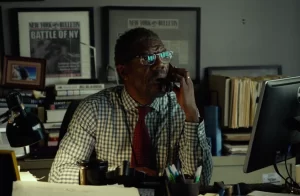
Marvel Entertainment / The Walt Disney Company
MCU Easter eggs in the First Season of Daredevil began with the show’s overall villainous plot as several crime lords have come together and risen to power amidst the rebuilding of portions of New York following the Chitauri invasion led by the Asgardian God of Mischief Loki as seen in The Avengers. The criminal underworld is fueled by drugs, financial conspiracies, human trafficking, and of course murder, and Matt Murdock quickly finds himself in a war to bring the regime down both in court alongside his best friend and fellow lawyer Foggy Nelson and on the streets as the black-mask-wearing Devil of Hell’s Kitchen. The event that MCU fans know as “The Battle of New York” is referred to as “The Incident” throughout the series. Jessica Jones: Season One tied into the larger MCU specifically in its fourth episode with the introduction of Audrey and Carlo Eastman. The Eastman’s are a married couple who hate super-powered people due to the destruction that occurred in the Battle of New York, in which Audrey’s mother died. This is a plot device that Marvel Studios really began to lean into as they built to the 2016 film Captain America: Civil War. Narratively speaking, the general public (as well as the governments of the world) were becoming increasingly weary of the destruction caused by The Avengers while they fight to save the world. We’re talking both financially as well as in terms of casualties. These concerns would spark the passing of the Sokovia Accords into law and fuel the superhero Civil War that would tear The Avengers apart as efforts were made to regulate The Avengers under the United Nations following a straw that broke the camel’s back kind of incident in Sokovia when The Avengers fought the Artificially Intelligent robot of Tony Stark’s design known as ULTRON and a subsequent incident in Lagos, Nigeria that revolved around the recently recruited Avenger Wanda Maximoff. Jessica Jones in its fourth episode highlighted the public’s growing resentment for “gifted” people in a unique way that gives it distinct footing in the overarching MCU narrative. After The Avengers thwarted Loki’s invasion, they more or less returned to their extravagant lives while common people were forced to try and dig out from the mess they left behind, financially, mentally, and even spiritually, and the fourth episode shines a spotlight on all of that, following up on the brilliant ways in which Daredevil: Season One did the same.
Nonetheless, behind the scenes as Marvel Television continued to take on new projects, Kevin Feige and his Marvel Studios team were none too thrilled with the intended expansion of the Marvel Cinematic Universe into television and streaming and a sort of real-life Civil War erupted within Marvel Entertainment. This was a fight over characters and themes. As far as Marvel Entertainment as a whole was concerned, their shows and films existed in ONE Shared Universe, and everything was “All Connected.” On Kevin Feige and Marvel Studios’ side however, these shows were seen at the time as irrelevant, and the movies were all that mattered. Joss Whedon, who directed two Avengers movies for Marvel Studios in 2012 and 2015, respectively, while also assisting in the development of ABC’s Agents of S.H.I.E.L.D., in fact called the divide between Marvel TV and Marvel Studios out publicly in 2015, around the time that Daredevil was released on Netflix and that Whedon’s Avengers: Age of Ultron was released in theaters, stating “I think actually the movie people were a little bit cross about [Agents of S.H.I.E.L.D.]. They were sort of like ‘Well you can have this but not this. And this but not that.’ It’s complicated enough as it is without me adding another layer of complication. We also created a TV show called S.H.I.E.L.D. right before they made a movie where they destroyed S.H.I.E.L.D. So, everybody’s having a GREAT time!”
Future written works would reveal that Kevin Feige reportedly resented Marvel Television over Jeph Loeb and his team being given control over Jessica Jones and other Defenders characters because he had intentions of using them in the films, and this made for a somewhat hostile environment where Jeph Loeb and his team worked hard to stay true to the narrative that was being told in the Marvel Studios movies while Kevin Feige and his team made no effort to acknowledge anything that was happening on the television side of things. Kevin Feige was furthermore frustrated over having to answer to Marvel CEO Ike Perlmutter and his Marvel Creative Committee which oversaw all MCU projects at the time.
On August 31, 2015, everything came to a head with the announcement from The Walt Disney Company that moving forward, Marvel Studios would move out from under Marvel Entertainment and would fall directly under the jurisdiction of Walt Disney Pictures with Marvel Studios President Kevin Feige answering directly to Walt Disney Studios Chairman Alan Horn instead of Marvel Entertainment Chairman Ike Perlmutter. Reports emerged that revealed Kevin Feige had nearly resigned as Marvel Studios President due to the rift between himself and Perlmutter that had worsened over the course of the development of Captain America: Civil War. Disney CEO and Chairman Bob Iger talked Feige down with the promise that changes would come imminently, and those changes finally manifested themselves at the end of the Summer. These changes dramatically altered Marvel Studios as not only did Feige no longer have to deal with Perlmutter, but he no longer had to deal with the Marvel Creative Committee either, and the divide between the movie and film divisions that already existed widened to the point that each of the television shows significantly reduced their references to the events of the films, and to where most fans eventually grew to believe that only the productions that were produced by Marvel Studios were considered official MCU canon by Marvel Studios. In fact, despite many of the actors who signed Marvel Television contracts doing so under the impression that their shows took place within the MCU and an understanding that the potential was there for movie crossovers, it wasn’t until 2019’s Avengers: Endgame that the first instance of a character that was introduced by Marvel Television formally reprised their role within the Marvel Cinematic Universe in a movie and that was done on a technicality when James D’Arcy reprised his role as a Variant of his Agent Carter character Edwin Jarvis during the 1970’s portion of The Avengers’ Time Heist. Aside from that, Kevin Feige showed no interest in bringing characters introduced by Marvel Television to the big screen for MCU crossovers, and during the climactic Battle of Earth in Avengers: Endgame, characters from The Defenders Saga were nowhere to be seen.

Marvel Entertainment / The Walt Disney Company
In the meantime, and in addition to producing an Agent Carter series for ABC that Marvel Studios actually did actually work on in a limited capacity, Marvel Television went on to produce several other series’ including the widely hated Inhumans show on ABC and in select theaters (September 29, 2017), three Seasons of Runaways on Hulu (debuting November 21, 2017), two Seasons of Cloak and Dagger (debuting on June 7, 2018) on Freeform, and Helstrom on Hulu (October 16, 2020). Agents of S.H.I.E.L.D. meanwhile lasted for seven Seasons, ending on August 12, 2020.
On December 10, 2019, following the promotion of Kevin Feige to Marvel Chief Creative Officer by The Walt Disney Company, Marvel Television was folded into Marvel Studios with Jeph Loeb leaving Marvel Entertainment and the Studio focusing its television content on the production of shows for the Disney+ streaming service that would be firmly and undisputedly set within the Marvel Cinematic Universe, complete with multiple character crossovers from movies to television and from television to movies. Then, Phase Four of the Marvel Cinematic Universe launched what Kevin Feige has since labeled The Multiverse Saga. As Phase Four evolved, Feige began to explore some of the toys that his suddenly deeper and wider sandbox boasted, beginning with a deal with Sony Pictures (with whom Marvel Studios began working in 2015 when Spider-Man was brought into the MCU) that would canonize all of Sony’s past Spider-Man films and the entirety of Sony’s Spider-Man Universe with it. All of this came together in the production of the Marvel Studios / Sony Pictures 2021 film Spider-Man: No Way Home which brought several characters from past Sony Spider-Man films into the MCU 616-Universe including Tobey Maguire’s Peter Parker / Spider-Man from Spider-Man, Spider-Man 2, and Spider-Man 3, and Andrew Garfield’s Peter Parker / Spider-Man from The Amazing Spider-Man and The Amazing Spider-Man 2. What may have been the worst kept secret in Hollywood history was still monumentally exciting for MCU fans and longtime Marvel movie fans alike, but the dual Spider-Man appearances weren’t the only intended surprise. For also appearing in Spider-Man: No Way Home was Charlie Cox as Matt Murdock / Daredevil! Though his appearance was little more than a cameo, it was immensely thrilling to see Cox share the screen with Tom Holland (Peter Parker), Jon Favreau (Happy Hogan), and Marisa Tomei (Aunt May) and after more than three-years following the end of the Daredevil Netflix series, MCU fans could finally get excited for the character’s future! Around this time, Vincent D’Onofrio appeared in Marvel Studios’ Disney+ series Hawkeye in a reprisal of his role as Wilson Fisk / The Kingpin as well. Meanwhile, and due to the rocky past relationship between Marvel Studios and Marvel Television, fans openly wondered – and debated – whether or not the respective versions of Daredevil and Kingpin in No Way Home and Hawkeye were one in the same as the versions of the characters that appeared in the Netflix shows, but no clear answers came.
Following the Marvel Studios debuts of Cox and D’Onofrio, each of Marvel Television’s Netflix series’ moved over to Disney+ from Netflix on March 16, 2022. Then, at the 2022 San Diego Comic Con, Kevin Feige announced that Cox and D’Onofrio would reprise their respective roles in a Marvel Studios Disney+ series titled Daredevil: Born Again. From there, Charlie Cox appeared as Daredevil once again in Marvel Studios’ She-Hulk: Attorney at Law series on Disney+ (complete with the familiar Daredevil Netflix theme when She-Hulk questions who he is) and Cox and D’Onofrio each filmed scenes for Marvel Studios’ upcoming Disney+ series Echo. On top of all of that, Jon Bernthal (who debuted as Frank Castle / The Punisher in the Second Season of Daredevil) was confirmed to be appearing in Daredevil: Born Again in a reprisal of his Netflix role as well.
In November of 2023, Marvel Studios announced a new branding of select projects under the “Marvel Spotlight” banner. These were explained as projects that would be set within the Marvel Cinematic Universe that would focus on self-contained, character-driven stories that fans could enjoy without needing to catch up on other Marvel content. Echo was announced as the first MCU project under the “Marvel Spotlight” banner.
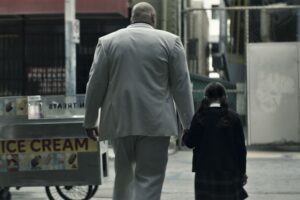
Marvel Entertainment / The Walt Disney Company
As the canon debate continued to rage, no one from Marvel Studios would either confirm or deny whether or not the continuity of the now former Netflix shows would be honored. Then, the 2023 book Marvel Studios – The Marvel Cinematic Universe: An Official Timeline seemed to confirm that the histories of the characters were NOT going to be honored, as there was no mention of either Daredevil of Kingpin in the book prior to their respective appearances in No Way Home or Hawkeye. However, during an interview with Screen Rant that aired on January 3, 2024 (less than three-months after the Official Timeline book was published), Marvel Studios Head of Streaming, Television, and Animation: Brad Winderbaum confirmed that the Netflix shows ARE canon and that the events seen in those shows took place within the MCU 616-Universe and upon the Sacred Timeline (a concept established in the Disney+ series Loki). This was further confirmed the following day when a new trailer promoting Echo featured footage from the now former Netflix shows. Then from there, on January 10, 2024 (the day after all five episodes of Echo dropped on Disney+), each of the shows that comprised The Defenders Saga were moved to fit into the MCU chronology on Marvel’s Disney+ “MCU Timeline” menu page.
It really was “All Connected” all along!
Marvel Studios’ Echo series premiered on Disney+ on January 9, 2024, with a Mature rating and very much boasting the spirit of the now former Netflix shows with plenty of blood, violence, and hard-hitting action scenes mixed in. Charlie Cox briefly appeared in the first episode of Echo, suited up in his familiar red suit (Cox wore a predominantly yellow suit in She-Hulk) battling the deaf soon-to-be-hero. Meanwhile, Echo’s past with Wilson Fisk (first established in Marvel Studios’ Disney+ series Hawkeye) was further explored with Vincent D’Onofrio stealing the show as Kingpin. As had been speculated in recent days, the past of Fisk as established in Daredevil was honored, specifically the murder of his father by his own hand when he was a child.
Echo garnered a respectable 73% Approval Rating on Rotten Tomatoes and was confirmed to have been significantly edited by Marvel Studios in post-production. While Echo was always intended to set the stage for Marvel Studios’ Daredevil: Born Again, that series has undergone numerous changes as well, with Marvel Studios deciding to completely overhaul the series mid-way through production. The decision came at a time of self-reflection for Kevin Feige and his team following the return to Disney of Bob Iger and during a challenging time for the Studio that in addition to a Writer’s and Actor’s strike included some of the worst-reviewed and worst-performing Marvel Studios productions since Feige went into independent filmmaking from the divisive Ant-Man and The Wasp: Quantumania, to the critically loathed Secret Invasion series, to the box office bomb The Marvels, and on to outside controversies that included the leave of longtime executive Victoria Alonso and the removal of Jonathan Majors as Kang the Conqueror (The Multiverse Saga’s intended Big Bad) due to a domestic violence incident and consequent arrest and conviction. Iger and Feige came together to approach the future from a “Quality over Quantity” standpoint with many suggesting that the decision to make The Defenders Saga canon only came recently and was made in desperation due to the general feeling that what the people that were overseeing the production of Daredevil: Born Again were doing with the characters and the overall narrative just wasn’t working. Chris Ord and Matt Corman were therefore relieved of their duties and Justin Benson and Aaron Moorehead, who previously worked for Marvel Studios on Moon Knight and Loki: Season Two, were brought in along with Dario Scardapane (who worked as a writer on The Punisher series) as the new showrunner. Daredevil: Born Again was originally slated for a 2024 release on Disney+ but is now expected to be released sometime in 2025. Daredevil regulars Deborah Ann Woll and Elden Henson have recently been confirmed to be reprising their respectful Daredevil roles of Karen Page and Foggy Nelson, another creative change that was made at the beginning of 2024. Thus far, Krysten Ritter has not been confirmed for an appearance in the show as Jessica Jones, though recent history certainly makes that possible.

Marvel Entertainment / The Walt Disney Company
Upon the MCU (Sacred) Timeline, Jessica Jones: Season One takes place after Daredevil: Season One and before Avengers: Age of Ultron.
Jessica Jones marks the first MCU television series to revolve around a female lead and the first Marvel production to revolve around a titular female character in a decade; since 2005’s Elektra produced by Marvel Studios with 20th Century Fox and starring Jennifer Garner.
In Jessica Jones, Carrie-Anne Moss portrays Jeri Hogarth; a defense attorney that is married to a woman named Wendy (portrayed by Robin Weigert) and involved in an affair with her secretary Pam (portrayed by Susie Abromeit). With its 2015 Netflix release, Jessica Jones marks the first MCU production to feature a lesbian couple in a prominent way. The show furthermore featured a male gay couple in a less prominent way, but this too was a first. Over the course of the years that followed the release of Jessica Jones, more and more MCU productions would feature LGBTQ characters including the Asgardian Warrior Valkyrie, the Variants of the Asgardian God of Mischief known as Loki L1130 and Sylvie, the Kronan Korg, the Eternal Phastos, the Multiverse-traveling America Chavez (and her lesbian aprents), and the Wakandan Warriors Ayo and Aneka of the Dora Milaje.
In Jessica Jones, Rachael Taylor portrays Jessica’s best friend and adopted sister Trish Walker. In the show, Trish is a physically and emotionally abused child that starred in a highly successful television series called It’s Patsy as a young girl. Patricia “Patsy” Walker is one of Marvel Comics’ oldest characters, dating back to 1944 when she first appeared in Miss America Magazine # 2. Patsy was created by Stuart Little and Ruth Atkinson as a character featured in Teen Humor tales before transitioning into Romantic Adventure tales. In 1965, Patsy appeared in Fantastic Four Annual # 3, giving her footing within the Marvel Universe and in 1980, Marvel established the early comics that featured Patsy as in-Universe fictional stories that were written by her mother. In 1976, Patsy became a superhero known as Hellcat in The Avengers # 144.
In Jessica Jones, David Tennant portrays the villainous Kilgrave. The character is better known to comic book readers as The Purple Man and was created by Stan Lee and Joe Orlando, first appearing in 1964’s Daredevil # 4. The Purple Man produces pheromones that allow him to verbally control the minds and actions of others. He was a longtime Daredevil villain before being prominently featured in Brian Michael Bendis’ 2021-2024 Alias series starring Jessica Jones.
In Jessica Jones, Will Traval portrays Officer Will Simpson. The character is based on the villainous Marvel Comics character known as Nuke (Frank Simpson). In the comics, Nuke is a psychotic man who takes color-coded pills to produce various bodily effects: red for increased adrenaline, white to keep him balanced between missions, and blue to bring him down. Similar pills are introduced in Jessica Jones, produced by an agency known as IGH. In the traditional Marvel comics, Nuke has ties to the Weapon Plus program (associated with Wolverine) and is subjected to a series of cybernetic experiments.

Marvel Entertainment / The Walt Disney Company
My Jessica Jones: Season One Review
AKA Ladies Night – Directed by SJ Clarkson. Written by Melissa Rosenberg.
Following the excellence that was Daredevil: Season One, I was excited to see what Marvel Television would do with Jessica Jones, and from the first episode, it was clear to me that the show was going to have no problem living up to the standard that was set with Daredevil. Unlike Matt Murdock / Daredevil, who had his own feature film 12-years before his streaming series premiered, Jessica Jones was unexplored territory, but through phenomenal casting, its moody atmosphere, and staying true to the spirit of the comics that it was based on, Jessica Jones got off to a riveting start, hooking me with the first episode.
As a character, Jessica is an alcoholic private investigator that boasts superhuman strength and strong instincts. She is a cynic who is largely unimpressed with the world and the people in it. She is in the midst of an all-consuming struggle in which she is trying to stand underneath the overwhelming weight of her past, the details of which are pretty much left dangling as a mystery in AKA Ladies Night.
We are introduced to several characters in the first episode, including Jessica’s lawyer acquaintance Jeri Hogarth (a highly successful lesbian lawyer whose life has become complicated due to an affair with her assistant Pam and her crumbling marriage with her wife: Doctor Wendy Ross-Hogarth), Luke Cage (a local bar owner that Jessica has taken to keeping tabs on during her free time and that she hooks up with in the first episode), Trish Walker (a successful local radio host and Jessica’s closest friend), Jessica’s drug-addicted neighbor Malcolm, and finally, Bob and Barbara Schlottman.
Bob and Barbara are the parents of a young track star named Hope who has gone missing. They hire Jessica to find their daughter. As Jessica digs deeper and deeper into Hope’s case, she slowly begins to deduce that a mysterious man from her past known only as Kilgrave is involved. Kilgrave boasts mind-controlling abilities that render his victims defenseless against doing whatever it is that he tells them to do, and Jessica once found herself under his spell. Jessica had believed Kilgrave to be dead, but now realizes he is very much alive and in a panic, Jessica’s first instinct is to flee the city, but she ultimately doubles down and successfully locates Hope at a hotel that Kilgrave used to take Jessica. This is when the show gets rather disturbing.
Kilgrave has ordered Hope to stay in the bed in which Jessica finds her. Therefore, Hope cannot get up out of bed. She has wet herself and Jessica has to wrestle her out of the room, physically forcing her to leave while Hope screamed in agony over leaving. From there, Jessica reunites Hope with her parents. Hope thanks Jessica for saving her and Jessica suggests that the reunited family leave the city and get as far away from Hope’s abductor as they can. As they leave Jessica’s residence however, Hope casually pulls out a gun and empties it, shooting and killing her mother and father, before creepily telling Jessica to “smile”, obviously still under Kilgrave’s spell. This initially leaves Jessica completely rattled, but she ultimately decides to declare war on Kilgrave.

Marvel Entertainment / The Walt Disney Company
AKA Crush Syndrome – Directed by SJ Clarkson. Written by Micah Schraft.
The second episode of Jessica Jones opens with Jessica being questioned at a local police precinct over involvement with Hope Schlottman and her deceased parents. Jessica has no tolerance for the line of questioning that she is given and is especially appalled that law enforcement confiscated pictures that she’d previously taken of Luke Cage. Jessica ventures to Cage’s bar and tries to cover for herself by telling Cage that she had been hired by the husband of a woman that Cage had being sleeping with. This is of course, a lie, but it prompts Cage to call things off with the woman, as he actively tries to avoid such drama. The other woman does not take the whole thing well, however. She confronts her husband over hiring Jones, and he insists that he did no such thing, learning in the process that his wife had been unfaithful. The angry man decides to then rally members of his rugby team to join him in confronting Cage at his bar. Jessica hurries to give Luke a hand, witnessing for the first time not only his immense physical strength (which rivals her own) but also his unbreakable skin.
In the meantime, Jessica convinces Hogarth to take Hope Schlottman’s controversial case. Jeri is initially uninterested in trying to defend a person who was so obviously guilty, but Jessica knows that Hope is innocent on the technicality of having been min-controlled, and she persuades Hogarth with the promise of an owed favor in exchange for Hogarth taking on Hope’s case. From there, Jessica continues to try and track down Kilgrave and through flashbacks, we are shown that Kilgrave was with Jessica when he was hit (and presumably killed) by a bus. Jessica tracks down the ambulance driver that drove Kilgrave to Metro-General Hospital on the night of the accident, discovering the man to have donated both of his kidneys to Kilgrave and to be a stroke victim. The man has been rendered a shell of his former self while falling under the custody of his mother; a religious zealot who faithfully believes her son’s condition was an answer to prayer by God. In another very disturbance sequence, the man desperately begs Jessica to kill him, but with sadness in her eyes, she insists that she could never do such a thing. There is a great exchange between them though in which Jessica tells him: “God didn’t do this. The Devil did. And I’m going to find him.”
Retrieving numbers from the man’s dialysis machine, Jessica next tracks down the doctor who performed surgery on Kilgrave on the night of the bus crash. He has retired from medical practice to teach at a local University where he is trying to live in anonymity, and he bolts in a panic after laying eyes on Jessica. Jessica gives chase and the doctor explains that Kilgrave forced the ambulance driver to donate both of his kidneys with his power of suggestion and that surgery was performed upon Kilgrave without anesthesia. Jessica deduces that this could be Kilgrave’s weakness and convinces the now former doctor to speak with Hogarth in Hope’s defense.
As for Hope, Hogarth’s meeting with her reveals to Jeri that Jessica had been a victim of Kilgrave’s as well once upon a time.

Marvel Entertainment / The Walt Disney Company
AKA It’s Called Whiskey – Directed by David Petrarca. Written by Liz Friedman with Scott Reynolds.
Taking advantage of her neighbor Malcolm, Jessica completes a complicated and lengthy process of possessing a surgical grade anesthetic with which to combat Kilgrave while Hogarth arranges for Hope to appear on Trish’s radio show and to be interviewed by Trish. Hogarth insists this is to give Hope a chance to change the public perception of her and her case, but it’s actually an attempt by Hogarth to give everyone listening a glimpse into just how crazy and delusional that her client is amidst hopes of landing an insanity plea.
Trish urges anyone who may have had an experience with Kilgrave to contact Hogarth and then proceeds to angrily insult Kilgrave. Jessica urges Trish to stop amidst fears of provoking Kilgrave, but Trish refuses to relent until Kilgrave himself calls into the show. The mere sound of his voice sends Hope into a frenzy while Trish quickly grows to understand the extent of her foolishness.
Jessica is deeply concerned that Trish will be targeted by Kilgrave, but Trish (who’d been taking a series of self-defense / combat fighting classes) insists that she can take care of herself. Trish soon realizes just how wrong she is however when a law enforcement officer arrives at her apartment on a mission from Kilgrave to kill her. Jessica rushes to her friend’s aid and fights the policeman off, but he is relentless in his assault. Jessica finally uses the anesthetic to subdue Trish, convincing the officer that Trish is dead which allows him to bring himself to leave.
Jessica follows, and at long last discovers Kilgrave’s whereabouts. Watching quietly from a distance, Jessica witnesses the officer report on Trish’s death after which Kilgrave casually instructs him to walk off the roof of the high and luxurious penthouse that Kilgrave has taken up residence in. Jessica frantically prevents the officer from complying and also makes eye contact with Kilgrave. After subduing the policeman, yet another chase ensues with Jessica having to fight off members of the family that Kilgrave had taken advantage of. Jessica is consequently unable to catch up to Kilgrave, but she is able to convince the officer (Will Simpson) that he did indeed walk off the roof as Kilgrave had instructed but that she had caught him. With Kilgrave’s spell having lost its hold, she also ensures Officer Simpson that Trish is still alive.
Also, while searching the residence that Kilgrave had been occupying, Jessica discovers countless photographs of herself and realizes that Kilgrave has had eyes on her all along and this leaves her deeply disturbed.
So, Kilgrave … what a sleazy and perverse and maniacal and intriguing villain. The concept of mind control is a horrific one and it is not a trope that the MCU has shied away from when you look at a relic such as the Mind Stone and characters such as Clint Barton and Bucky Barnes who fell victim to having their minds controlled and doing the bidding of others. You can even look at the residents of Westview and what Wanda Maximoff did to them as another example, but I don’t know, there is just something about Kilgrave that seems more disturbing. It shouldn’t. Bucky killed countless people, Hawkeye brought down numerous S.H.I.E.L.D. Agents, and the residents of Westview were literally trapped inside a television show against their wills. Yet, it does, and I think that’s simply because in Jessica Jones, it feels more personal. Making people wet themselves and cook dinner, and abandon their children, and murder their parents … it’s just all so raw and creepy, and that’s not counting the disturbing little hints of what he did with Jessica and forced her to do. It’s gross and it’s detestable and it really establishes Kilgrave very early on as a unique villain while certifying Jessica as a very unique hero in terms of how damaged she really is.
So, Luke Cage … Mike Colter is tremendous! He is extremely likeable with his soft voice and kind eyes and his relationship with Jessica is slowly developed through some quite explicit sex scenes that don’t boast any real nudity but do show in tremendous detail what it might be like for two super-powered people to hook up. When Luke and Jessica are intimate, it’s loud, it’s raw, and it’s rough. This is another thing that has not been addressed in the MCU. Tony and Pepper are both human, with Steve and Peggy, only one of them is enhanced, and we never actually saw a hook-up scene with Bruce and Natasha, but for those who wonder what it might be like, this show is not shy about answering that question. In these early episodes, the complexity of Jessica’s relationship with Luke is also frequently teased with her guilt over something being a frequent focal point. Luke writes it off as being a consequence of him being widowed, but it is made clear throughout the first three episodes that something is up and that there is a reason for Jessica’s not-so-quiet obsession with Luke Cage.
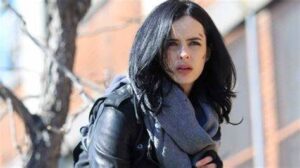
Marvel Entertainment / The Walt Disney Company
AKA 99 Friends – Directed by David Petrarca. Written by Hilly Hicks Jr.
In the fourth episode, Jessica takes on a new case, that of a woman named Audrey Eastman, who believes her husband is cheating on her and wants photographic proof. This is an episode where the ties of Jessica Jones to the wider Marvel Cinematic Universe are formally stressed. Audrey Eastman and her husband Carlo end up being revealed as haters of the “Gifted” people that have made headlines in recent years. Her story specifically alludes to the Battle of New York and The Avengers, though neither are referenced by name. “Aliens” are referenced however, and Jessica even mentions the “big green guy” and the “flag waver.” (Luke Cage had also previously mentioned the “big green dude and his crew”). Anyway, the hiring of Jessica was actually a set-up by Audrey and Carlo to murder Jessica, but they of course end up being no match for her, and in a show that rarely boasts any comedy of note, it is very satisfying and kind of funny to watch Jessica scare the absolute shit out of the couple, insisting that she knows “99 people” just like her and that she will be informing them about what the Eastman’s tried to do to her.
Elsewhere, Hogarth (with help from Jessica) tries to comb through the numerous “victims” of Kilgrave and separate the true victims from the liars. This was another at times humorous sequence due to the extravagance of the various stories. Hogarth also takes Jessica up on the favor that she owes her by demanding that Jessica dig up some dirt on her wife.
Also, Will Simpson begins to assist Jessica in her campaign against Kilgrave while trying to desperately make things right with Trish. Simpson is horrified by the pain that he caused her and needs her forgiveness and companionship in order to maintain his own sanity.
Then, there is Luke Cage. A wounded and rattled Jessica ventures to Luke’s apartment following the confrontation with the Eastman’s and we finally learn what has been driving Jessica’s obsession with Luke. It turns out the Luke’s wife Reva was killed during the bus crash that was thought to have killed Kilgrave, but she wasn’t actually a victim of the crash … Jessica, under orders from Kilgrave, murdered Reva with a powerful blow to her chest. Since that time, Jessica has sort of watched over Luke in a sort of twisted form of self-therapy, trying to ease her guilt by proving to herself that Luke is okay. When that failed, she decided to sleep with him in yet another twisted sort of coping mechanism as she tried to make up for Luke’s loss by becoming his gain. Though I do believe that Jessica’s attraction to Luke was sincere, their interactions are nonetheless a by-product of Jessica’s mental instability and once revealed to me as a viewer, the whole thing seems unfair to Luke and makes Jessica feel like a psychopath, especially since she continuously acknowledges to herself how royally screwed up her actions are. Hence all the drinking, I guess!
Anyway, this episode closes with another huge reveal as Jessica discovers that her neighbor Malcolm has been the person providing Kilgrave with the many, many photographs of her and she once again tries to come to terms with the fact that Kilgrave has virtually been right down the hall from her all along.
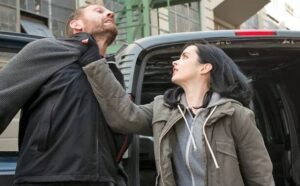
Marvel Entertainment / The Walt Disney Company
AKA The Sandwich Saved Me – Directed by Stephen Surjik. Written by Dana Baratta.
This episode of Jessica Jones took us into Jessica’s past and showed some of her exploits as she threw around the idea of being a superhero. We saw a comic accurate costume tease (which was fun) and learned that Jessica first encountered Malcolm when she intervened on behalf of him while he was being violently assaulted. This was also the moment in time that Jessica first encountered Kilgrave and her life would never be the same.
In the present, Jessica conspires with Trish and Will to abduct Kilgrave. The trio follows Malcolm to a meet-up with Kilgrave where a distraction by Jessica allows Simpson to shoot Kilgrave with an anesthetic dart that subdues him long enough for Jessica and Simpson to throw him in the back of a getaway van driven by Trish. Though the trio successfully detained Kilgrave, they underestimated the level of protection that Kilgrave had built around him and his minions give chase and fight Jessica, Trish, and Simpson off and rescue Kilgrave.
A frustrated Jessica soon receives a phone call from a reawakened Kilgrave, who taunts her as only he can while promising to leave Malcolm be in exchange for daily selfies of Jessica that would be provided by Jessica. She begrudgingly agrees and then begins working with Malcolm to help him overcome his addiction.

Marvel Entertainment / The Walt Disney Company
AKA You’re a Winner! – Directed by Stephen Surjik. Written by Edward Ricourt.
I found the sixth episode of Jessica Jones to be extremely emotional. Luke Cage comes back into Jessica’s life, hiring her to help find the missing brother of someone that has evidence suggesting there was more to the death of his wife Reva than what was reported. It turns out that Luke has never bought the “official story” and that Reva had left him instructions on where to dig up a box that she deemed significant in terms of the information contained within it prior to her death. This of course fills Jessica with panic, as she knows exactly what Luke is talking about and she takes the case amidst hopes that she can get ahead of Luke and analyze the information before he is able to see it.
Jessica does what she does and quickly finds the missing brother. This leads to a scuffle pitting her and Luke against a gang of thugs and Jessica sort of abandons Luke and returns the brother to the sister, but Luke arrives mere moments later and obtains the information he is seeking. The file that is given to Luke reveals that the bus that allegedly killed Reva was being driven by a driver that was intoxicated. Enraged, Luke sets out to murder the driver, forcing Jessica to intervene.
In a really tense and again, emotional scene, Jessica comes clean with Luke, explaining that the box that Luke believed had been left for him by Reva was actually dug up by Jessica with Reva on the night of her death under orders from Kilgrave. Jessica then admits that Kilgrave ordered her to kill Reva and she complied. It was only after Jessica killed Reva that the bus crash occurred. Luke’s reaction is heartbreaking, as he isn’t so much angry that Jessica was Reva’s killer as he is that Jessica had slept with him and misled him as he quickly grew to care about her and see through her a potential end to his daily torment; a way to move on. He calls Jessica a “piece of shit” and walks away from her in disgust.
In the meantime, we see Kilgrave manipulate a poker tournament and use the money to buy Jessica’s family home, which he interestingly does without using his powers on the homeowner. We also learn that Hope Schlottman was pregnant with Kilgrave’s baby and after Hope pays a fellow inmate to beat her up in an effort to have a miscarriage, Jessica assists her in aborting the fetus, the remains of which Hogarth deviously obtains without Jessica’s knowledge.
Really solid episode here that moved the narrative forward in a lot of intriguing ways. Luke and Jessica falling out was sad, as I really like them as a couple, but it had to happen if they were ever going to move forward.

Marvel Entertainment / The Walt Disney Company
AKA You’re a Winner! – Directed by Simon Kellen Jones. Written by Jenna Reback and Micah Schraft.
The seventh episode of Jessica Jones opens with a drunken and distraught Jessica getting thrown out of a bar as she struggles with the whole Luke Cage thing. In her fragile emotional state, Jessica confronts Hogarth’s wife Wendy in an effort to force her to sign Hogarth’s divorce papers. Wendy doesn’t respond to Jessica’s threats in the best way and Jessica consequently dangles Wendy over the train tracks as a train approaches. Jessica inadvertently drops Wendy and ends up having to save her from being hit by the oncoming train, after which Jessica flees the scene and stumbles to her apartment with help from an attentive Malcolm. Things go from bad to worse however when Jessica finds the bloody and deceased body of her neighbor Ruben in her bed.
Kilgrave has been in her apartment! And Kilgrave is the cause for Ruben’s death!
I haven’t really written about Ruben and his sister Robyn and that’s because I wasn’t really invested in their characters. They were used primarily as comic relief and a way to sneak some controversial material into this show when it comes to the nature of their relationship, but they ended up serving a pretty big purpose as Ruben’s death had a definitive impact on Jessica, as she felt what happened to him never would have, had he never known her.
This discovery sends a panicked and irate Jessica into a frenzy, and she quickly decides to incriminate herself so that she can be locked up in a supermax prison where she knows that if Kilgrave were to come for her, the use of his abilities would be captured on camera. Jessica demands that Hogarth represent her and then quietly says goodbye to the city before returning to her apartment to find Trish there. Jessica learns that Trish has cleaned her apartment from any evidence of Ruben and that Malcolm was actively disposing of the body. Jessica rushes to Malcolm and decapitates the head of Ruben, which she then defiantly takes to the local police precinct.
There, Jessica confesses to the murder and demands to be taken into custody, going so far as to demonstrate her uncanny strength to startle the lead investigator. Soon, officer Mahoney intervenes in Jessica’s interrogation and announces that she is free to leave. As it turns out, Kilgrave has arrived and has positioned everyone at the station to be in the direct line of fire by either self-inflicted gunshot wounds or as victims of someone else that is armed. Kilgrave tells Jessica that he loves her and reveals that his obsession with her only increased after the bus incident due to her being able to suddenly resist him. He longs for surprise and genuine acceptance without coercion and informs her that he left her a surprise at her apartment. Jessica is allowed to walk away with everything that had happened being documented as a joke after Kilgrave orders it to be so and Jessica soon joins Kilgrave at her childhood home while Will Simpson looks on in disbelief.
I thought this was a really powerful and positive episode in terms of redeeming Jessica as a reluctant hero. Exactly how much guilt and stress Jessica has been juggling over Reva and over Luke and now with Ruben was really emphasized and seeing Jessica volunteer to take the blame and get locked up reflected a level of selflessness we had yet to really see from this character. I came out of this episode rooting for her more than ever, and I’m sure that was the point!
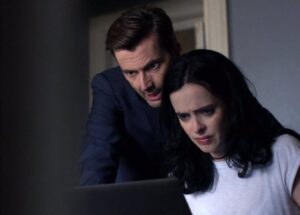
Marvel Entertainment / The Walt Disney Company
AKA WWJD? – Directed by Simon Cellan Jones. Written by Scott Reynolds.
So, is it okay to like Kiolgrave? No. I don’t think it is, but between the excellent writing of this episode and the undeniable charm and charisma of David Tennant, I found myself at times struggling to NOT dislike Kilgrave! And that is ridiculous because this character is absolutely despicable and gross and icky, but again, there were times during this episode that I found myself feeling empathy for the Kilgrave character.
This cleverly titled episode of Jessica Jones started with Jessica uncomfortably browsing through her childhood home, which Kilgrave has painstakingly replicated to look the way that it did when Jessica was young, and her brother and parents were still alive. This is one of those times where you almost feel for Kilgrave because for all intents and purposes, it really seems like he genuinely did all of this to make Jessica happy. She of course let’s him know how vain it all is, but in his own way, he really does seem to be trying here, and that is because he is legitimately in love with Jessica … as best as he knows to define it, anyway.
Kilgrave wants to trust Jessica and he wants Jessica to somehow find a way to trust him without any mind manipulation on his part. He wants Jessica … no he needs Jessica to want him. The whole thing is appalling from Jessica’s perspective nonetheless, from Kilgrave taking Jessica’s phone from her so she can’t record him, to the mind manipulation of his servants. For Jessica, all of Kilgrave’s attempted good deeds are smoke and mirrors and she can see through all of it. For her, he is a rapist and a murderer, and he is responsible for pretty much everything that is currently wrong with her.
Shortly after arrival, Jessica encounters Will Simpson upstairs and learns that he has infiltrated the house and planted a bomb in the basement. Trying to do things “by the book” has lost its appeal to Officer Simpson. He wants Kilgrave dead by any means necessary. After convincing Simpson that she is not under Kilgrave’s spell, Jessica gets him to leave, insisting that Kilgrave must be kept alive until Hope is cleared and stealing Simpson’s phone in the process. She then takes Kilgrave to the basement and shows him the bomb, which he has his security dispose of (or so Jessica thinks).
From there, we see a really fun breakfast scene between Kilgrave and Jessica that grows to include a bitchy neighbor and after she talks down to Jessica through a series of insulting lies, Kilgrave humiliates her, to Jessica’s quiet delight. Kilgrave then shares an unprecedented number of details about his personal life and his own childhood. Retrieving the box that Jessica dug up with her bare hands on the night of Reva’s death, Kilgrave pulls a flash drive from out of it and inserts it into his computer, revealing shocking video of the tortures that the parents of Killgrave put him through in an effort to unlock his unique abilities. Learning this jars Jessica and as the conversation with Kilgrave continues, Jessica is prompted to take Kilgrave out to resolve an ongoing domestic dispute that is receiving a great deal of media coverage. Killgrave complies and he and Jessica combine their efforts to swiftly resolve the issue without incident. This scene is made all the better by Kilgrave’s sincere confusion over why he can’t just have the offender off himself. Overwhelmed by the thought of how much good Killgrave could accomplish if he used his powers for the greater good, Jessica meets up with Trish and shares a philosophical debate with her over the complex morale conflict that has suddenly risen up within her.
In the meantime, we see Kilgrave having some mean-spirited fun with his servants and we see him respond to a text from a desperate Hogarth who needs Jessica to find dirt on her wife as soon as possible, as if he were Jessica, surely to remind us of who he really is, but at the same time, he was genuinely thrilled with the good deed he had done that day with Jessica and believes that she could perhaps really teach him many, many that he never learned. In other words, they could make quite the team! Jessica isn’t having any of that, however.
After bringing home a meal that she knew Kilgrave would love, Jessica uses the meal to subdue his servants and then injects a giddy Kilgarve with the anesthetic, knocking him out and preparing to move him to the location of a soundproof room that she and Simpson had previously discovered. Things quickly take a turn for the worse for Simpson though, as he is approached by the aforementioned bitchy neighbor, who has been instructed by Kilgrave to detonate the bomb that was intended for him in a suicide that serves as an effort by Kilgrave to take Simpson out.
This was such a wickedly delightful episode, and it did such a great job of toying with the emotions of viewers in such a unique way. The fact that it made me sort of feel sorry for Kilgrave is a reflection of its excellence, and this was primarily due to the exceptional talents of David Tennant. His impassioned and sort of whimsical performance was mesmerizing, and I cannot compliment him enough for his ability as an actor to manipulate the viewing audience the way that he did throughout this episode and at other times over the first half of the Season. That being said, I just knew that Jessica had made a terrible mistake in leading Kilgrave on the way that she did and that there would be absolute hell to pay.

Marvel Entertainment / The Walt Disney Company
AKA Sin Bin – Directed by John Dahl. Written by Jamie King and Dana Baratta.
The ninth episode of Jessica Jones felt to me like it was all about cornering a dangerous animal with its back against the wall and then carelessly taunting said animal. Here, we see that Jessica has successfully encaged Kilgrave in the hermetically sealed room in which she and Simpson chose to imprison him, and the game has certainly changed. Jessica is now in control and her plan is rather simple: mercilessly torture Kilgrave until his abilities are captured on-camera in all their manipulative glory. Yes, it’s still about Hope above all else, but for Jessica, this is also fun. Kilgrave is not only tortured by his feelings of helplessness, but also by an electrical current that has been rigged within the ankle-deep water in the room through which he can be electrocuted at Jessica’s whim. On top of that, Jessica is playing video after video of the childhood tortures that Killgrave brought himself to share with her while Jessica mockingly and repeatedly calls him “Kevin”; his birth name, as revealed in the videos. Soon, Jessica is joined by Hogarth, who is both appalled by the situation and mildly curious to see Kilgrave’s powers on display. Hogarth furthermore informs Jessica that Hope has been offered a plea deal and that she intends to advise Hope to take it, adding urgency to Jessica’s ongoing mission. There is a lot to do and very little time to do it.
In the meantime, Will Simpson’s entire story takes a hard left turn. Trish is rushing him to the hospital in a panic as he begs her to get him to a “Doctor Kozlov.” Simpson is soon greeted by the mysterious doctor and Simpson asks Trish to leave per the doctor’s request. A concerned Trish ventures to Jessica’s location while Simpson is administered a series of pills that return him to instant physical health while also reducing his mental capacities.
Back at Kilgrave’s torture chamber, Jessica decides to enter the room and beat the holy hell out of Kilgrave. She punches her former captor repeatedly, but he cleverly refuses to make her stop, pleading for Jessica to refrain and really playing up the wrongly accused angle for the camera (and Hogarth). This almost breaks Jessica, but Trish forces her to refrain with the electrical current. Kilgrave and Jessica both are left equally frustrated. Soon, Jessica stumbles upon a photograph of Kevin’s mother (Louise Thompson). Believing that a meeting with his parents could be the very thing to make Kilgrave break character, Jessica forces a meeting with Louise, who she recognized from Malcolm’s support group. Jessica follows Louise back to her hotel where she demands that she and her husband Albert leave with her to meet with their son. The elderly couple agrees but admits that they are deathly afraid and had been doing everything possible to elude Kilgrave for years. They insist that they never intended to torture Kevin; claiming that everything that was ever done to him was an effort by them to help him after he was diagnosed with a degenerative neural disease. Jessica arranges a family reunion and also forces her two-time interrogator Officer Clemons to observe everything that is about to happen as a witness. All of the pieces are in place and Jessica prepares to set into motion her plan of provoking Kilgrave into being filmed using his abilities for Hope’s sake, but Jessica in all of her maneuvering made one grave mistake … she left Hogarth alone with Kilgrave.
Louise and Albert Thompson enter the cage and reunite with their son Kevin. After some initial lashing out by Kilgrave over his parents abandoning him, Kevin seems to need and appreciate the affection his mother begins showing him. A warm embrace causes him to let his guard down at which point Louise stabs him with a pair of large shears. After pulling away in agony, an enraged Kilgrave orders his mother to pick up the shears. Jessica is thrilled to no end, as she is getting the footage that she so desperately needed. As Kevin, to the dismay of everyone in the room not named Jessica, tells his mother to stab herself with the shears for every year that he was abandoned, Jessica hits the electrical switch, but the wire has been cut! As Louis plunges the shears into her flesh again and again and again, Jessica tries to break into the cage and stop Kilgrave, who orders his father to tear out his own heart. Consumed by horror and panic, Trish opens fire, shattering the glass that Kilgrave was contained behind and striking him in the shoulder. Kilgrave is injured, but Kilgrave is free! Kevin quickly orders Trish to put a bullet in her head and she swiftly complies, placing the gun in her own mouth and pulling the trigger … but she’d fired off all of her rounds. Kilgrave than orders Officer Clemons to follow him and having been handcuffed by Jessica, Clemons gruesomely breaks his own wrist in order to break free and comply. Jessica gives chase and finally takes hold of Kilgrave and he angrily orders her to let go of him, but she does not instantly comply. This serves as a moment of clarity for Jessica as she realizes that she has become completely immune to Kilgrave’s abilities, and this revelation changes the game again.
This was an incredible episode with everything from the moment that Kilgrave was reunited with his parents serving as one of the most intense, disturbing, and suspenseful sequences in MCU History. Really well done by all involved.

Marvel Entertainment / The Walt Disney Company
AKA 1,000 Cuts – Directed by Rosemary Rodriguez. Written by Dana Baratta and Micah Schraft.
Hogarth’s efforts to flee the scene failed as Kilgrave was able to get within speaking distance of her and order her to drive him to a doctor. Carrie-Anne Moss’s acting throughout this sequence was really great as you could see the fear and concern in her eyes as she is unable to not follow Kilgrave’s every command. She of course takes him to her estranged wife Wendy, and he casually orders Wendy to tend to him, but as she does, he quickly grows quite fond of Wendy, realizing they have a lot in common. Wendy describes the way that Hogarth has hurt and abandoned her as “1,000 tiny cuts.” Meanwhile, we learn through this scene that Hogarth was the one that sabotaged the electrical current in exchange for Kilgrave forcing Wendy to sign Hogarth’s divorce papers and agree to Hogarth’s terms. Having been properly tended to, Kilgrave betrays Hogarth, telling Wendy to assault Hogarth with “1,000 cuts.” Wendy goes into a violent rampage, mercilessly cutting Hogarth again and again and again until Hogarth’s lover Pam intervenes, smashing Wendy in the head with a heavy base, sending Wendy falling to the ground and smashing into the edge of a glass table, killing her. Jessica arrives upon the scene just a second too late and with enough time to lash out at Hogarth for her foolishness and selfishness.
Meanwhile, Trish has taken Albert to try and contrive a sort of cure for Kilgrave through a vaccine of Albert’s design after he revealed that Kilgrave spews a virus through which he controls others. He believes that Jessica may be the key to a cure, given her newfound immunity. Kilgrave is desperate to find his father and he infiltrates Jessica’s apartment to offer her a trade: Hope in exchange for Albert. Jessica had already convinced Hope not to take the plea deal, but Kilgrave, since leaving Wendy’s place has used his abilities to arrange for Hope’s unconditional release from prison. He insists that he only wants custody of his father and to be allowed to get as far away from Jessica as he can in return. However, as great as this deal seems, Kilgrave reveals that he’s known he had no control over Jessica ever since the bus incident, which reveals there never was any sincerity in his professed decision to not force Jessica into doing anything that she didn’t want to do. The gesture was never noble … it was desperate. Kilgrave furthermore insists that Jessica had previously chosen to stay with him once upon a time, an incident we see play itself out through a flashback, but Jessica reveals she only stayed because she was unable to bring herself to kill herself in those brief moments of clarity. Jessica soon ends the uneasy conversation by knocking Kilgrave out, at which point she is assaulted by Malcom’s support group.
The reason for this is due to Robyn covertly overhearing Malcolm confess the fate that befell Ruben to the group. Robyn angrily rallies the troops so to speak, declaring that Jessica is the real problem, and they all go to seek out Jessica to get revenge. For all the things this show has done right, I didn’t really care for this little swerve. I felt like the collective victims of Kilgrave went along with Robyn far too easily, but the whole thing did serve the narrative as Robyn freed Kilgrave and Jessica failed to meet Hope upon her release, allowing her to fall back into Kilgrave’s custody.
A lot also went down with Will Simpson here that I wasn’t crazy about either. He begins purposefully consuming far beyond the suggested dose of his pills and the drugs (which reduce pain and enhance combat performance) turn him into a psychopath. Not only does he destroy all of the evidence that Jessica had on Kilgrave by burning down the entire place in which Kilgrave was held, he also shoots Clemons in the head. He then tracks down Trish and Albert and violently strikes Trish, which I really didn’t like either. His reasons for doing these things are because he wants Kilgrave dead – not incarcerated, and even if he is all jacked up on those pills and not thinking rationally, it just felt dumb given what we had learned about the character up to that point.
From there, this episode ends on a real downer. Jessica is lured by Kilgrave to “their favorite restaurant” where she finds Hope sitting with him at a table while the members of the support group who attacked her are all standing on the bar with nooses around their necks. I think after taking so much time to force viewers to see the world through Kilgrave’s eyes, this scene specifically forces you to remember who he really is. He is absolutely captivating as a character and that is due once again to the undeniable charm with which David Tennant portrays the character, but this scene simply lets you see the deviousness of Kilgrave; the rapist; the murderer; the psychopath.
Kilgrave quickly establishes that the vaccine Albert deduced is ineffective by beckoning Albert to join him. Kilgrave taunts Jessica and whatnot but Hope, in a shocking moment, shatters the glass that she is holding and stabs herself in the neck with it. She doesn’t do this because Kilgrave tells her to. She does this because she wants to. And this is all entirely Kilgrave’s fault. Hope’s is conveyed as the most innocent life that Kilgrave has destroyed, and in this way, Hope serves as a reflection of Killgrave’s evil. With her dying breath, Hope makes Jessica promise to kill Kevin and after ensuring that no one successfully hung themselves, Jessica is now ready to do what she knows she not only must do, but what she now fully understands that she can do. And as a viewer, I now fully want her to.
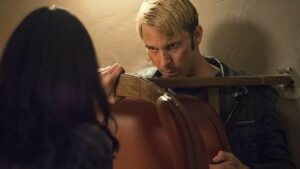
Marvel Entertainment / The Walt Disney Company
AKA I’ve Got the Blues – Directed by Uta Briesewitz. Written by Scott Reynolds and Liz Friedman.
The eleventh episode of Jessica Jones pretty much revolved around Will Simpson’s psychotic breakdown and how it grew to affect both Jessica and Trish. Simpson has gone full-on crazy and after he stalks Trish, he then murders two men right in front of her before locking her up in her apartment. He then seeks out Jessica at her apartment / office in an effort to kill Jessica. Trish intervenes, and the trio engage in an awesome fight that sees Trish take one of Simpson’s pills in order to be able to physically hang with him (Jessica can’t really do it after getting hit by a truck while searching morgue’s for Kilgrave’s father).
Jessica and Trish end up incapacitating Simpson but the pill that Trish took has an adverse and life-threatening affect on her and she nearly dies but is ultimately saved by paramedics. For me, I just felt again that Simpson went too crazy here. He suddenly felt like a character that we never really knew, and I guess I just liked the post-spell version of Simpson that would do anything to make right by Trish. It was sweet and sincere in what is an extremely cynical show, and all of that was tossed out the window here as Will is painted out to be just as f’d up as everyone else is, and there is actually some commentary on the reality of that in a sequence between Malcolm and Robyn which compliments everything that I just wrote about Simpson, but still, I wasn’t a fan.
This episode also gave us some enjoyable (albeit disturbing) flashbacks to Jessica and Trish when they were kids. I haven’t gotten into the flashbacks much in these reviews, but the casting was sensational, and the scenes are riveting, from the car crash that killed Jessica’s family to the child abuse that Trish suffered at the hands of her mother. Watching young Jessica toss Trish’s bitch mother across the room was a very satisfying and empowering moment!
This episode ends with Kilgrave texting Jessica with the news that he’d found her “boyfriend” and Jessica rushes to Luke’s bar, arriving just in time for him to close a window after making eye contact with her and to see the bar go up in flames due to a violent explosion. Luke survived of course, but Jessica is significantly rattled, nonetheless.

Marvel Entertainment / The Walt Disney Company
AKA Take a Bloody Number – Directed by Billy Gierhart. Written by Hilly Hicks Jr.
This episode begins right where the previous episode left off, with Jessica learning from Luke that Kilgrave had ordered him to blowup his own bar while inside of it and to let Jessica see it. Jessica is both horrified and concerned to learn that Kilgrave had made contact with Luke Cage, and she spends a great deal of energy trying to make sure that Luke has not been ordered to do anything else. She deduces that he hasn’t, and Luke, now understanding the extent of Kilgrave’s power and influence vocally forgives Jessica for everything that had occurred between them, including the death of Reva. There was also a nice flashback sequence that showed Kilgrave meeting Luke that I very much enjoyed.
Jessica and Luke begin working together in a mutual effort to find and kill Kilgrave, quickly deducing that Kilgrave has been using his father to boost his powers of influence (hoping that he can find a way to control Jessica again), making him more dangerous than ever. A nightclub where Kilgrave had recently tested his upgrades is investigated and located by Jessica and Luke, but Kilgrave meets them there and reveals that Luke has been under his influence the entire time since the bar explosion and that he had been regularly reporting back to Kilgrave all of the details of their investigations.
After several moments of bragging, Kilgrave orders Luke to kill Jessica.
The ensuing fight between Jessica and Luke really made this show feel like a superhero show for the first time for me. The showdown was everything a superhero fan could have hoped for with various displays of violence and strength from both characters. The fight ends when Jessica is forced to resort to shooting Cage in the face with a shotgun at point blank range. It was the only way that she could ensure her own survival and it absolutely devastated her.
The other big development in this episode was Trish Walker learning that the doctor who treated Will Simpson worked for a company called IGH and goes on to discover that IGH had some sort of involvement with Jessica as well following the car accident that killed her family.
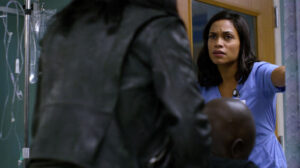
Marvel Entertainment / The Walt Disney Company
AKA Smile – Directed by Michael Rymer. Written by Jamie King and Scott Reynolds with Melissa Rosenberg.
The Season Finale of Jessica Jones: Season One stuck the landing in a very satisfying way, bringing together several dangling plot threads and showcasing Jessica against all odds finally conquering Kilgrave!
Much of the episode revolved around Luke Cage and Jessica trying to save his life. She rushes Luke to Metro-General where she encounters Claire Temple (from DaredeviI), who, in typical Claire fashion volunteers to help Jessica tend to Luke and flee the hospital. Kilgrave is at the hospital too, and he calls Jessica to gloat, because he just can’t resist doing that, and when she tries to catch-up to him, he commandeers the hospital audio system and tells everyone in the hospital to kill Jessica Jones. Really crazy stuff there, and Jessica ultimately escapes and reconvenes with Claire at her apartment. Jessica helps Claire save Luke’s life by holding him down in the midst of a seizure while Claire administers medicine through Luke’s eyes (great stuff). Claire and Jessica then share some down time getting to know each other while Claire tends to the scalpel cut that Jessica received at the hospital. Rosario Dawson was really great throughout this episode, and it was really cool to hear the subtle references to Daredevil and what not.
Meanwhile, Kilgrave has become even more unhinged and there is a great sequence with him outside alone talking himself up about everything he is going to do to Jessica if his later power upgrade works. The scene illustrates his obsession and his fragile psyche and once again reminds us that he is the villain of this story. Kilgrave’s father ends up giving Kevin a super-dose of the concoction he has contrived to give him the upgrade (created from the fetal remains that Hogarth confiscated), and things do not go well for Albert from there, as he has lost his usefulness. Kilgrave has one of the gay men that he has taken up residence with chop off Albert’s arms and put them in a blender amongst other things, and when Jessica finds him, she is tremendously disturbed to find that he is still alive. He holds on long enough to tell Jessica that Kilgrave was successfully upgraded.
From there, Jessica conspires with Trish to take Kilgrave down, cleverly arming Trish with a pair of headphones and sending her in as a distraction to confront him. Kilgrave has planned to leave the city on the aforementioned gay couple’s yacht and has assembled a group of people to stand in-between he and the pursuing Jessica and Trish. Kilgrave orders the crowd to kill each other which slows Jessica down a bit. Trish gets caught-up in the conflict and loses her headphones. As Jessica closes in, Kilgrave orders everyone to “stop!” and Jessica freezes along with everyone else.
Kilgrave isn’t buying it. At all.
Trying to get Jessica to reveal her ruse, Kilgrave orders Trish to come to him. He then promises to make her his slave and forces her to kiss him with passion. Jessica remains frozen except for a single tear that runs down her face. That tear convinces Kilgrave that Jessica isn’t faking, and he gleefully approaches her, at long last having her back under his control. Kilgrave tells Jessica to tell him that he loves her, and Jessica looks at Trish and says “I love you”… this was their previously established safe-word and Jessica really was faking! She then casually lifts Kilgrave off his feet and tells him to smile and then aggressively snaps his neck, killing him.
I loved that moment!
It was in this way that Jessica Jones and Daredevil shared similar conundrums, but with very different outcomes. Both Jessica and Matt Murdock came to the conclusion that the best way to protect the innocent was to eliminate the threat … kill the villain. Matt of course, ultimately decided against this, but Jessica did not, and I say, good for Jessica! Kilgrave needed – and deserved – to be taken off the board. He needed to be eliminated. It was the only way to ensure that he wouldn’t hurt anyone else ever again. I think Wilson Fisk deserved the same thing in Daredevil, but I also understood Matt’s conviction and his inability to bring himself to do it. Jessica however does not share that same conviction. She is a very different kind of hero as this First Season frequently reminded us from its first episode. For her, there was no debate to be had. She had to do what she did.
Jessica is arrested for killing Kilgrave in the middle of the street with her bare hands, but Hogarth defends her and ends up convincing the prosecutor to drop the charges against her by describing in detail how much of an uphill battle it would be in court, revealing that she would defend Jessica under the premise that Kilgrave ordered Jessica to kill him in an attempted suicide. So, Jessica walks free and returns to her apartment where she is joined by Malcolm and begins taking new cases for Alias Investigations.
As for Luke Cage, he quietly left after regaining consciousness and learning from Claire that Jessica had killed Kilgrave.
It’s difficult for me to articulate my overall feelings on this show. That’s because I typically watch superhero shows and movies for an escape from the madness that is the real world, but this show does not offer that. Jessica Jones: Season One is alcoholism and drug abuse and child abuse and rape and murder and suicide and abortion… it is not a feel-good show. Personally, I would not want the Marvel Cinematic Universe to become like this all the time, but there is a place for it and though it isn’t rainbows and unicorns or whatever, it is a very unique character study on one’s struggles (Jessica’s in this case) to overcome their past and that is something that I think a lot of people can relate to.
Krysten Ritter, David Tennant, Mike Colter, Rachael Taylor, Erin Moriarty, and Carrie-Anne Moss gave incredible and believable performances with each actor toying with the emotions of viewers in different ways. This is not your typical superhero show, and at the time that it was released in 2015, it was remarkably unique. Jessica Jones came out before Deadpool or Logan or even DC’s Batman vs Superman: Dawn of Justice. Those facts combined with its female lead made this an immensely groundbreaking production within the genre and I have a sincere appreciation for it even though it is kind of a downer. At various times over the years, Marvel productions have been accused of being “all the same” or “following the same formula.” If nothing else, you have to admit that Jessica Jones was not like that.

Marvel Entertainment / The Walt Disney Company
Highlights of Jessica Jones: Season One:
David Tennant as (Kevin) Kilgrave
Krysten Ritter as Jessica Jones
Mike Colter as Luke Cage
Rachael Taylor as (Patsy) Trish Walker
Erin Moriarty as Hope Schlottman
Carrie-Anne Moss as Jeri Hogarth
Rosario Dawson as Claire Temple
The Entire Hermetically Sealed Room Sequence
Chemistry Between Krysten Ritter and Mike Colter
Jessica Jones vs Luke Cage
Jessica Going to the Place that Daredevil could never Go
Concerted Focus on the Growing Mistrust of Superheroes by Ordinary Citizens within the MCU


Leave a Reply